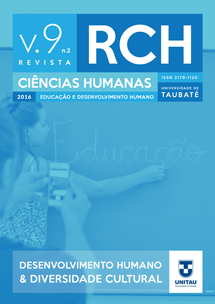LIMITES E POSSIBILIDADES DAS OFICINAS COM FAMÍLIAS NOS CRAS
DOI:
https://doi.org/10.32813/2179-1120.2016.v9.n2.a325Resumo
Este artigo tem por objetivo refletir sobre o quanto as crenças, atitudes e valores familiares podem influenciar as aquisições que se espera sejam conquistadas pelas famílias e/ou seus membros nas oficinas com grupos no Serviço de Proteção a Atendimento Integral à Família (PAIF), tais como autonomia, protagonismo e empoderamento social. Nessa perspectiva optou-se por realizar um levantamento bibliográfico sobre as pesquisas que vem sendo publicadas sobre o tema. Foram selecionadas 34 publicações, entre os anos 2009 a 2015, que apresentavam temática específica sobre o PAIF, sendo divididas por objetivo tratado na pesquisa. A pesquisa possibilitou analisar quais temáticas tem sido mais abordadas nos estudos publicados sobre os trabalhos realizados com famílias nos Centros de Referência de Assistência Social (CRAS). As crenças, valores e atitudes identificados nas famílias acompanhadas no PAIF, podem representar limitações e possibilidades a serem enfrentados pelos profissionais que desenvolvem oficinas com grupos. Tais limitações não se restringem apenas a metodologia a ser desenvolvida, mas também denotam a reprodução e a manutenção de uma lógica fatalista presente nas famílias, que compromete a promoção do fortalecimento de vínculos e a efetiva transformação, a fim de potencializar protagonismo e autonomia dessas famílias. Embora o objetivo seja encontrar subsídios para discussão sobre os resultados que estão sendo alcançados através das oficinas com famílias, constatou-se, por meio do levantamento bibliográfico realizado, que tal assunto vem sendo pouco abordado.
Métricas
Downloads
Publicado
Como Citar
Edição
Seção
Licença
As publicações da Revista Ciências Humanas estão registradas sob a licença Creative Commons Attribution CC-BY.
1. Os conteúdos dos trabalhos são de exclusiva responsabilidade de seu autor.
2. É permitida a reprodução total ou parcial dos trabalhos publicados na Revista, desde que citada a fonte.
3. Ao submeterem seus trabalhos à Revista os autores certificam que os mesmos são de autoria própria e inéditos (não publicados em qualquer meio digital ou impresso).
4. Os direitos autorais dos artigos publicados na Revista são do autor, com direitos de primeira publicação reservados para este periódico.
5. Para fins de divulgação, a Revista poderá replicar os trabalhos publicados nesta revista em outros meios de comunicação como, por exemplo, redes sociais (Facebook, Academia.Edu, etc).
6. A Revista é de acesso público, portanto, os autores que submetem trabalhos concordam que os mesmos são de uso gratuito.
7. Constatando qualquer ilegalidade, fraude, ou outra atitude que coloque em dúvida a lisura da publicação, em especial a prática de plágio, o trabalho estará automaticamente rejeitado.
8. Caso o trabalho já tenha sido publicado, será imediatamente retirado da base da revista, sendo proibida sua posterior citação vinculada a ela e, no número seguinte em que ocorreu a publicação, será comunicado o cancelamento da referida publicação. Em caso de deflagração do procedimento para a retratação do trabalho, os autores serão previamente informados, sendo-lhe garantido o direito à ampla defesa.
9. Os dados pessoais fornecidos pelos autores serão utilizados exclusivamente para os serviços prestados por essa publicação, não sendo disponibilizados para outras finalidades ou a terceiros.





